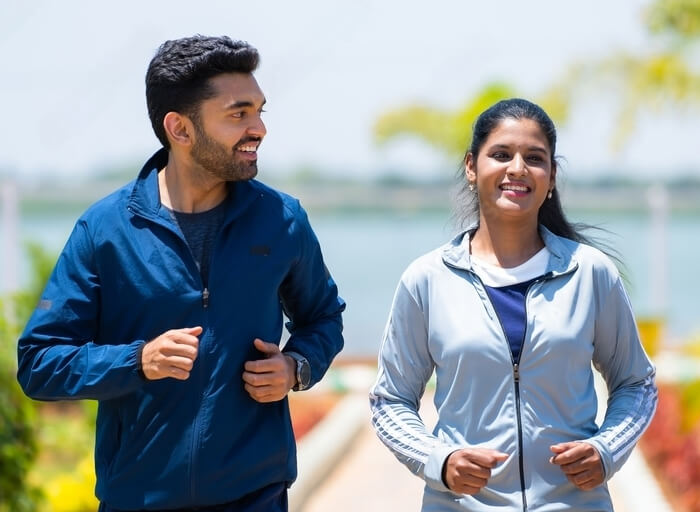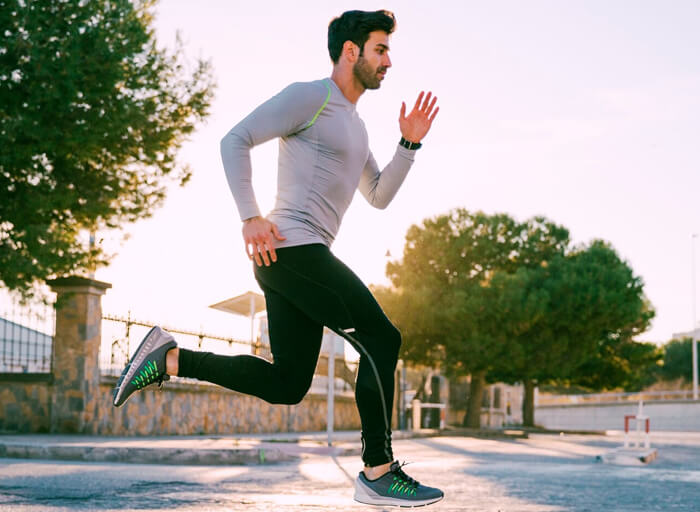Blog
Does running improve bone health?
Want to know a secret to improving your bone health that's often overlooked?
It's running! Yes, you heard that right!
Running, a weight-bearing activity, not only enhances your cardiovascular health and helps you burn calories, but it can also strengthen your bones and prevent injuries such as stress fractures.
As an athlete, bone health is crucial not only for physical performance but also for overall well-being. Now, let's dive into the nitty-gritty of it. Bone health is all about the strength and integrity of your bones, which is essential for ultimate physical performance.
Poor bone health can lead to conditions like osteoporosis, osteopenia, and stress fractures, which can seriously impact your athletic abilities and increase the risk of injuries. That's why maintaining good bone health is a top priority for athletes, and running can play a significant role in achieving this goal.


While most people are aware that running is a great way to boost cardiovascular health and burn calories, the impact of running on bone health is often overlooked.
Running is a weight-bearing activity, which means that it places stress on your bones, making them stronger over time. However, the impact of running on bone health can vary depending on several factors, such as age, gender, and training history.
In this blog post, we will delve into the research to explore whether running improves bone health.
What is Bone Health, and Why is it Important?
Bone is a living tissue that is constantly changing and adapting to external factors. It is made up of collagen, calcium, and other minerals that provide strength and structure to our body. Bone health refers to the strength and integrity of bones, which is important for overall health and physical performance.
Poor bone health can lead to several conditions such as osteoporosis, osteopenia, and stress fractures. These conditions can impact an athlete's performance and increase their risk of injuries, making it essential to maintain good bone health.
Does Running Improve Bone Health?
The impact of running on bone health has been extensively studied, and the consensus is that running can improve bone health in several ways.
Running is a weight-bearing activity that places stress on the bones in the legs, hips, and spine. This stress signals the bone-forming cells (osteoblasts) to build new bone tissue, making bones stronger and denser over time. Several studies have found that running is associated with higher bone mineral density (BMD) in the hip and spine, which are common sites for osteoporotic fractures.
Higher BMD indicates stronger bones that are less likely to fracture, which is essential for athletes. Several studies was done on long-distance runners which shows an increase in bone density.
And also these studies states that during physical exercise, the level of plasma calcitonin can increase, which is thought to be a process of increasing bone mass.
According to a research the weight-bearing exercise group, the long-distance running group showed wide increase in the bone density of spine, radius and tibia.

Impact of Running on Different Age Groups
While running can improve bone health in people of all ages, its impact can vary depending on the age of the individual.
In children and adolescents, running can improve bone health by promoting bone growth and development. Several studies have found that children and adolescents who participate in weight-bearing activities such as running have higher bone density than those who are sedentary.
In adults, running can help maintain bone density and prevent age-related bone loss.
In older adults, running can improve balance, coordination, and muscle strength, reducing the risk of falls and fractures.
A study published in the Journal of Aging and Physical Activity found that running was associated with better balance and muscle strength in older adults.


Impact of Running on Different Genders
The impact of running on bone health can also vary depending on the gender of the individual. Women are at a higher risk of developing osteoporosis than men, making it essential to maintain good bone health.
Several studies have found that running can improve bone health in women, particularly in postmenopausal women. A study published in the Journal of Bone and Mineral Research found that running was associated with higher BMD in postmenopausal women.
However, some studies have found that the impact of running on bone health in men may be limited. A study published in the American Journal of Sports Medicine found that running was not associated with higher BMD in young adult men.
Factors That Can Impact the Impact of Running on Bone Health
While running can improve bone health, its impact can vary depending on several factors, such as:
Running intensity: Higher-intensity running may be more effective at promoting bone health than low-intensity running.
A study published in the Journal of Bone and Mineral Research found that high-impact activities such as running were associated with higher BMD in postmenopausal women than low-impact activities such as walking.
Running history: Individuals who have been running regularly for a longer period may have better bone health than those who have just started. A study published in the Journal of Osteoporosis found that long-term runners had higher BMD than short-term runners (yet to quote the study)
Nutrition: Adequate calcium and vitamin D intake is crucial for bone health. Runners should ensure that they are consuming enough calcium and vitamin D through their diet or supplements to support their bone health.
Genetics: Genetic factors can influence bone health and may impact the extent to which running improves bone health.
In summary, the research suggests that running can improve bone health, particularly in children, adolescents, women, and postmenopausal women. Running is a weight-bearing activity that places stress on the bones, promoting the formation of new bone tissue and improving bone density. However, the impact of running on bone health can vary depending on factors such as age, gender, running history, nutrition, and genetics.
So, what's the takeaway here?
Running can improve your bone health, but the extent of its impact varies depending on several factors. If you're an athlete looking to improve your bone health, it's essential to maintain a balanced diet with adequate calcium and vitamin D intake, and ensure you're running at an appropriate intensity level. With dedication and consistency, you can achieve better bone health, better performance, and a better you!"

